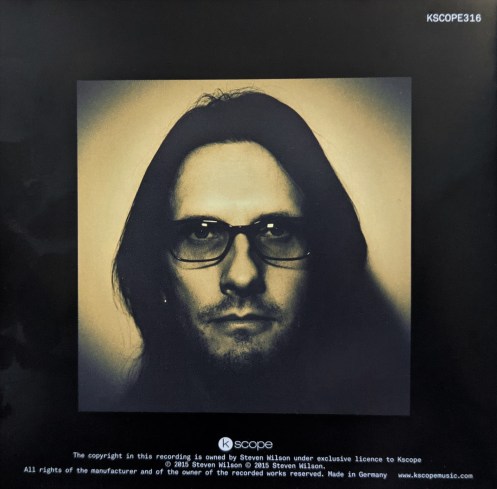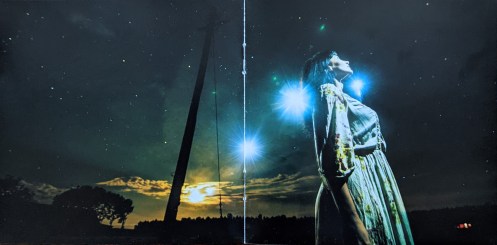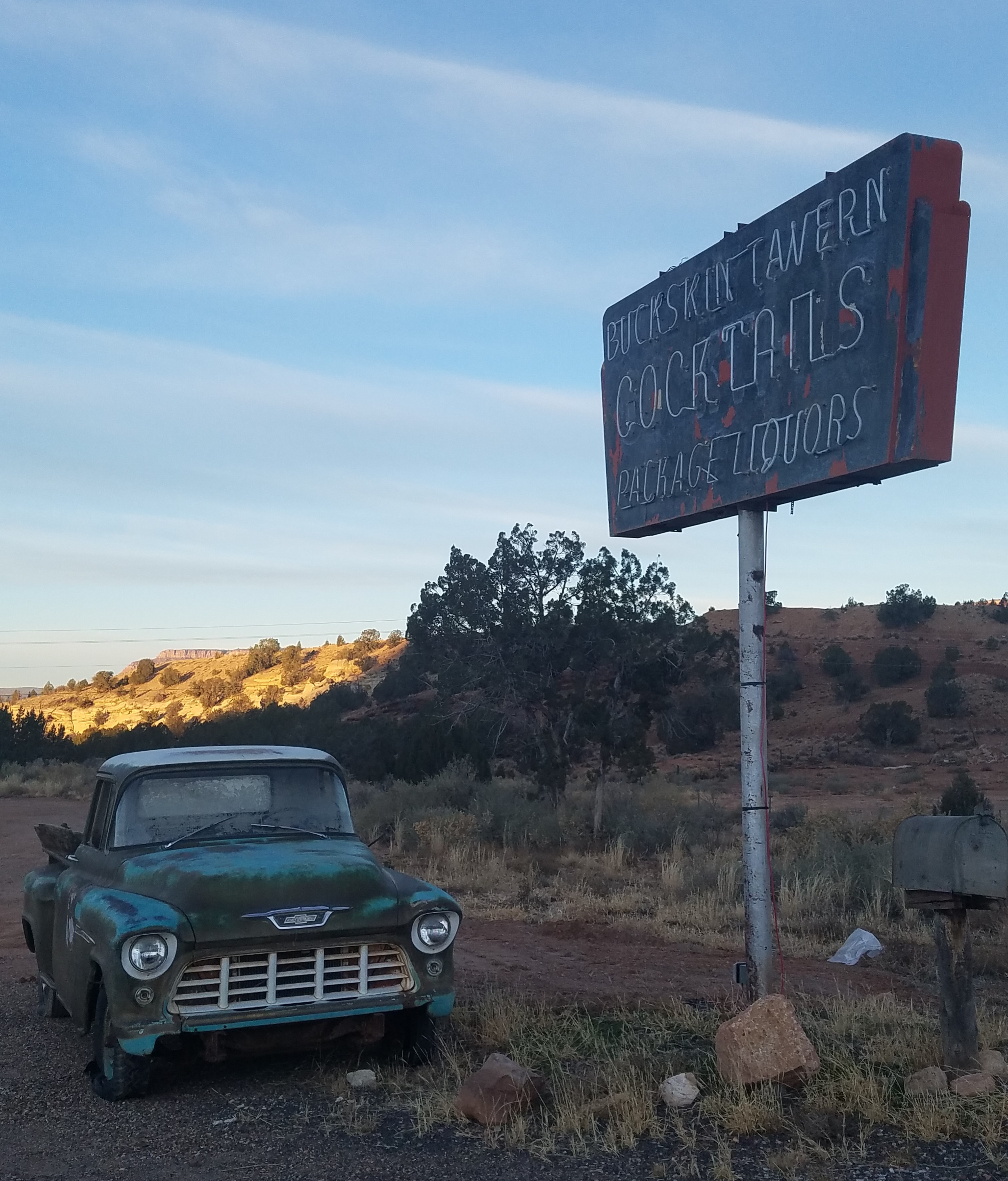Band.Cannot.Erase.
It was morbid curiosity that first drew me to Hand.Cannot.Erase. I was fascinated when I read that Steven Wilson‘s 2015 album had been inspired by the true story of British woman in her thirties who died in the apartment in which she lived alone and whose body was only discovered two-plus years later. It was said she had family and friends but somehow had not been missed. The additional, possibly apocryphal detail that wrapped presents for a niece and nephew were found in the apartment reinforced the story’s sadness. Being something of a gloomy type, I was seized. I ordered the CD immediately.

It is best described as muddling through, a general numbness suspended occasionally by daydream moments of serenity. Adamant, obstinate efforts at planning, manipulating and avoidance bring only fleeting reprieve. No light flickers at the end of what may not be a tunnel after all but rather an abandoned mineshaft. The vague promise of a swaddling warmth that sometimes haunts the foggy margins fails to fully coalesce.

I was aware of Steven Wilson through Porcupine Tree — a band whose music I tended to respect more than listen to — in addition to having heard he collaborated in some way with Opeth — another group in which my interest was more theoretical than actual — but I had not been moved to explore his solo work. Even when I ordered Hand.Cannot.Erase., it was its cited inspiration that had attracted me rather than the artist himself. So, after the CD arrived, I focused on trying to suss the story in the lyrics rather than listening to the musical whole. Finding only allusions instead of a direct narrative I soon set the album aside, leaving it to languish on my shelves.
It sits right at the edge of me. At times it feels like it will break wide open but it never does. When it wells up, seemingly on the verge of full dilation, any active effort to facilitate its forward march leads instead to withdrawal. Resisting release and yet refusing to depart, it rests in the periphery in between false labors.
Fast forward to 2018 and I decided to grab a ticket to see Mr. Wilson and band play live in Phoenix. In those heady pre-pandemic days I was opting in to almost any hard rock or heavy metal show that came through, seeking to make up for 20 years spent in assignments abroad that precluded all but the occasional concert. Hand.Cannot.Erase. all but forgotten, my pre-show preparation was limited to streaming Porcupine Tree’s Deadwing on the drive to the venue.

The gig turned out to be excellent. Not knowing much of the music beforehand allowed me to soak in it, eschewing attention to individual songs in favor of taking in the whole. The musicianship was amazing and the music progressive, ranging from hard-edged riffs to poignant rolling piano to extended soaring guitar excursions. Wilson’s vocals were often yearning, and when accompanied on a few refrains by Israeli singer Ninet Tayeb, whose band had opened, the resulting atmosphere was epic and mesmerizing. Googling Ninet afterwards, I found that she had guested on some of Wilson’s studio work and further, that the moments that had moved me so much in the live setting were from the very album I had so hastily forsaken.
As with a shaken soda pop, careful start-stop venting can slowly reduce internal pressure while protecting against unwanted spills. However, the temptation to just rip off the tab and release the full force in one staining belch is strong. Lacking confidence in the ability to exercise a measured touch, it often proves easier to simply forego immediate refreshment and return the disturbed container to the shelf, leaving it on its own to somehow dissipate the tension.
Revisiting Hand.Cannot.Erase. with new ears, I discovered what I now consider to be a masterpiece of progressive observation. I had been wrong to expect that Wilson would simply narrate the heart-rending story that had intrigued him, and later me. Instead, he immerses the listener in its broader setting, creating through music and words a world in which we are better able to discern and contemplate the deeper soul of the tale. Wilson has crafted an immensely perceptive, musical essay on the nature of modern isolation. While emotional AF, the prog rock opus remains anchored in compassion throughout, never straying into the maudlin. I mean it as high praise when I say that, when sitting on my shelf, Hand.Cannot.Erase. rates as just one more great album amongst many, but it carries the unique distinction of consistently, if fleetingly, rising to become my absolute favorite record of all time each time I lose myself in its thrall.
It is hard to pinpoint exactly from whence the obstinance originates. In the millisecond before rote suppression, minute leakage leaves little doubt that positive could be attained via the liberation of negative. This counterpoint consistently fails to coalesce into any tangible form, however. It remains content to cast its haze across all and sundry, leaning back in a self-satisfied Mussolini pose while repeating with malignant glee, “Because I damn well said so.”

The album begins with hints of Rush, Camel, and Pink Floyd as Wilson delivers an extended opening declaration of deep empathy (3 Years Older). “I can feel you more than you really know,” he says while perceptively describing the life of the modern isolated. The journey continues with insightful commentary, musical and verbal, on the familiar life paths that contribute to isolation. First, a soft lean toward progressive pop shows us the slow drift of romantic love taken for granted (Hand Cannot Erase), after which arrives a spoken word tale of mislaid friendship over church organ synths and muted trance percussion (Perfect Life), and finally comes an extended tour de force of quiet, progressive epicness, with vocals shared between Wilson and Ninet, in which aging parents find themselves existing beyond the departure of their children from the nest (Routine).
At this point, the focus on the individual is left behind in favor of calling out the choices made and passive acceptance that furthers the spread of isolation. A prog-metal intro recalling King Crimson and soaring David Gilmour-style guitar poems soundtrack an angry tirade against the tyranny of online existence now infecting humanity. “Download sex and download God… Download the life you wish you had” (Home Invasion). Next comes a gently strummed acoustic reminder that today can be the start of a new, positive path out of the funk if passivity is set aside, advice which unfortunately comes to naught as change is repeatedly put off until tomorrow (Transience). More epic prog goodness follows as Society comes in for scorn for its failure to identify its slowly disappearing members and bring them back into the fold before they completely fade away (Ancestral).
The musical journey ends on an optimistic piano-led note as one of the isolated catches themselves just before succumbing to the quicksand, deciding to reach out to a long-lost loved one. Putting pen to paper, no excuses are made but a sincere desire to reconnect is expressed (Happy Returns). Were the listener ignorant of the true-life story that inspired the album, a reassured smile would accompany removal of the headphones. Knowing what we know however, the dénouement in the final lyric is devastating:
Do the kids remember me?
Well I got gifts for them…
But I’m feeling kind of drowsy now
So I’ll finish this tomorrow




I have a few of his albums, but this isn’t one of them… and reading this has me wondering why I’ve never followed this up, but making me think that I should be making this a priority pick up.
Thanks for the read, J. I can’t compare this with any of his other solo albums as I haven’t heard them but, as you can tell, this one really connected with me, albeit long after I got it. Writing this one has me wondering why I’ve never followed this up too. Any recommendations or warnings regarding his other stuff?
Strange thing is, I’m probably more familiar with his solo stuff than TD. Cannae mind how I first got into his stuff, but I think it was a pal who suggested that I’d like The Raven That Refused to Sing. That took a while, but it’s really good. The other I like is To the Bone. They’re particularly good (well, I reckon so). I also really like his latest one, though it seems to have divided fans.
Really enjoyed this. I don’t know this one at all, to be honest I am much more au fait with him as a remixer/remaster-er chap than a musician. One of my good friends is an absolute fanatic about him, although he is struggling to like his very latest one.
That is such a sad pay off at the end too.
Probably not one to play when the world needs an injection of 1537 dance art, but a great one for headphone journeys to a deeper love for sad humanity…
This was amazingly put together, thank you. I’ll certainly plug my best set in for this one later and let the music take me. Thanks for the share!
Many thanks back at you. The kind words are much appreciated.
Having begun then paused my reading of your post when I encountered what I guess are sections of the lyric/narrative requiring more attention than was available at the time, it has taken longer than anticipated to return.
How fitting, then, that I spent much of today writing a long-ish piece on Dark Side of the Moon, whose themes of alienation vs connection (and other existential trifles) seem to resonate harmoniously with Hand.Cannot.Erase.
I got onto Porcupine Tree many years ago now, probably around ’94. I liked the early albums with their toughened Floydisms, but as they became more metallic I became demagnetised and lost contact with Mr Wilson’s solo career. Seems that was a mistake on my part, one which I will attempt to remedy.
Very pleased you made it back. Our intent here is to be available at the customer’s convenience, so we’re just happy for the chance to serve whenever you stop by.
Nope, neither lyric nor narrative, rather just words strung together by yours truly that somehow seemed (to me) to fit the ambience. I have been known on occasion to put unfinished thoughts on paper, sit on them for a while, and then to shoehorn them into some other construction simply because they seem (to me) to harmonize.
I’ve been trying some other Wilson solo output since posting this but, while attractive, it hasn’t resonated with me the way H.C.E. does.
Well I can emphatically respond that I very much enjoyed this shoehorning. I guess it might be described as a kind of curated creative response that here complements the implied inner desperation of the album’s protagonist.
Hope you occasionally get to enjoy a sofa.
Given what I surmise to be your day job VC, you have my gratitude for not saying “couch.”
Given what I surmise to be yours, I would not consider it. (Grin)
For Sir, I recommend ‘Fear of a blank planet’.
That one and Deadwing are the two Porcupine Trees that have been sitting snubbed on my CD shelves for a few years. I was moved by your comment to pull down FoaBP and found myself immediately engaged. The playing and composition are great, and the fact that it has a previously unrecognized (by me) theme that fellow travels with the Hand.Cannot.Erase bugle call appeals greatly. Thanks to you, it has now been rescued from the obscurity to which I had previously condemned it.
Now that is a happy ending to the story. 🙂
Soda.
Shit.
Ah ha ha ha ha h aha ha!! LOL